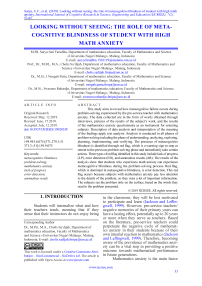Looking without seeing: the role of metacognitive blindness of student with high math anxiety
Автор: Surya Sari Faradiba, Cholis Sa'dijah, Nengah Parta, Swasono Rahardjo
Журнал: International Journal of Cognitive Research in Science, Engineering and Education @ijcrsee
Рубрика: Original research
Статья в выпуске: 2 vol.7, 2019 года.
Бесплатный доступ
This study aims to reveal how metacognitive failure occurs during problem-solving experienced by the pre-service teacher with mathematics anxiety. The data collected are in the form of words obtained through interviews, pictures of the results of the subject’s work, and the results of the mathematics anxiety questionnaire as an instrument for selecting subjects. Description of data analysis and interpretation of the meaning of the findings apply text analysis. Analysis is conducted in all phases of problem-solving including the phase of understanding, analyzing, exploring, planning, implementing, and verifying. The presence of metacognitive blindness is identified through red flag, which is a warning sign to stop or retreat to the previous problem-solving phase and immediately take certain actions. Three types of red flag identified in this study include lack of progress (LP), error detection (ED), and anomalous results (AR). The results of the analysis show that students who experience math anxiety can experience metacognitive blindness during the problem-solving process. Red flag, which is dominant in metacognitive blindness, is error detection. This red flag occurs because subjects with mathematics anxiety pay less attention to the details of the problem, so they miss a lot of important information. The subjects see the problem only on the surface, based on the words they read in the problem presented.
Metacognitive blindness, problem-solving, mathematics anxiety, lack of progress, error detection, anomalous result
Короткий адрес: https://sciup.org/170198555
IDR: 170198555 | УДК: 159.955.6.075:[371.279.1:51 | DOI: 10.5937/IJCRSEE1902053F


